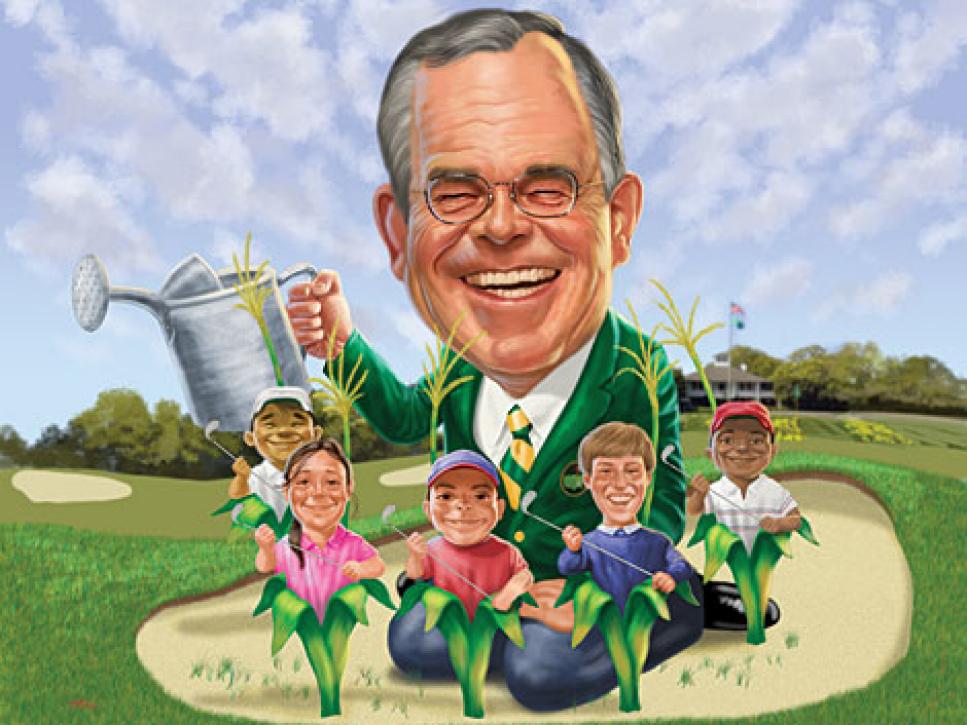News
Green Thumbs

Augusta National GC HAS always occupied a unique place in golf, being both at the heart of the game because of the Masters, the world's most watched tournament, and simultaneously above the game because of its powerful and private membership. But soon after
Tiger Woods' history-making performance in 1997, the club seemed to sense change was afoot. With deft grace it merged its twin roles and began the evolution into what it is today: A private club that operates as a quasi-governing body of golf, a role perhaps best demonstrated by its activist attitude toward growing the game.
Perhaps it was the sight of a 21-year-old man, the youngest winner ever, sharing hugs with a black father and Asian mother after slipping on the green jacket that made the powerbrokers behind the gates off Washington Road feel they were glimpsing golf's future. Seven months later, when The First Tee was formed to expand the youth base of the game, ANGC was one of the five founders, along with the USGA, PGA of America and the PGA and LPGA tours. Since 1998, ANGC and the Masters have given more than $11 million to The First Tee with the club's overall charitable contributions since then totaling nearly $36 million.
Expanding the club's role in growing the game seems to be at the top of Billy Payne's to-do list since he took over from Hootie Johnson as chairman in May 2006. In his second Masters, Payne moved the cable coverage from USA Network to ESPN, which reaches a younger audience, and for the first time had the Wednesday Par-3 contest televised. He also instituted a program to allow free admission to children 8 to 16 when accompanied by a badge-holding adult, expanded Internet coverage of the tournament and set up computer banks on the course to survey patrons about their experience.
"All prominent golf organizations share an obligation to grow the game," says Payne. "At Augusta National that mandate is decades old. From the tournament's inception, our founders, Bobby Jones and Clifford Roberts, established a permanent and prominent place for amateurs and consistently worked to increase exposure to the sport. We are acutely aware of this legacy and will continue to use the Masters' reputation, image and financial resources to fulfill this longstanding initiative."
Augusta National expanded that effort in February by joining with the RA and the Asia Pacific Golf Confederation to create the Asia Amateur Championship. It will be played at Mission Hills GC in China in October and the winner will receive a spot in the 2010 Masters, while the winner and runner-up will advance to final international qualifying for the British Open.
"We and the RA identified Asia as fertile ground that provides many opportunities to grow the game of golf," Payne says. "With the advent of the Asia Amateur Championship, we are confident that we will be creating local heroes who will inspire future generations of players in an area of the world that has tremendous potential and growth opportunities."
The RA, which governs the game outside the United States and Mexico, has increasingly become active in growth programs in Asia, helping set up China's junior program and being a partner in the Faldo Series, which has junior events in nine Asian nations. Using the worldwide exposure of the Masters is seen by the RA as a significant boost.
"Having the Masters brand associated with golf in Asia can only be good," says Duncan Weir, the director of golf development for the RA. "And with so many promising young Asian players now contending for places in the Masters and the [British] Open, increased television coverage and income may follow thereby allowing even more money to go back into golf."
The results from the first year of the Masters-ESPN relationship were extremely encouraging. The rating for the first round was up 16 percent from 2007 while Friday's rating improved 22 percent. Perhaps even more importantly, the ratings for the first and second round more than doubled the audience among men ages 18-34.
"They don't change things very often, [but] when they do it is for a good reason," ESPN spokesman Mark Mandel says about the club's decision to switch its cable coverage partner. "One of the things they wanted to do was reach a younger audience worldwide. We're thrilled with the results from the first year and hope to build on those numbers."
Mandel says the Friday telecast was the second most viewed golf telecast in cable history, its 3.1 rating trailing only the 4.2 ESPN got for the playoff at the 2008 U.S. Open.
The targeted younger audience also was reached via the Internet. ESPN.com referred more than 1.1 million visits to masters.org on each of the first two days of the tournament.
Augusta National also has played a prominent role in the effort to get golf into the 2016 Olympics, which will be voted on by the International Olympic Committee in October. "The Olympics would give golf the potential to generate new heroes and role models, hopefully inspiring someone to pick up a club for the first time," says Payne, who headed the successful 1996 Summer Olympics in Atlanta.
The Masters long has had an incidental link to expanding the game worldwide. Before joining Roberts to found Augusta National, Jones was embraced by British fans for his triumphs there. And it was after winning the '60 Masters and U.S. Open that Arnold Palmer decided to play his first British Open, helping restore the luster to that event. Now that link has become formalized with America's most private club taking a very public role in bringing the game to the world. And from what Payne says, that effort is just beginning.